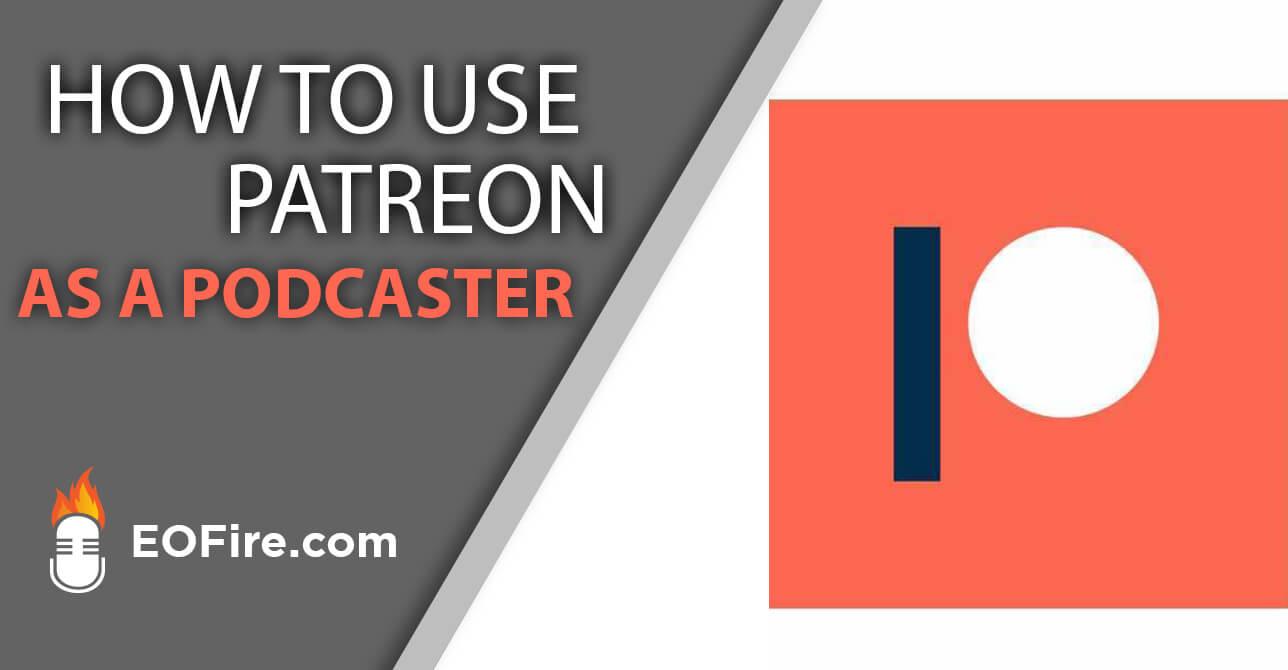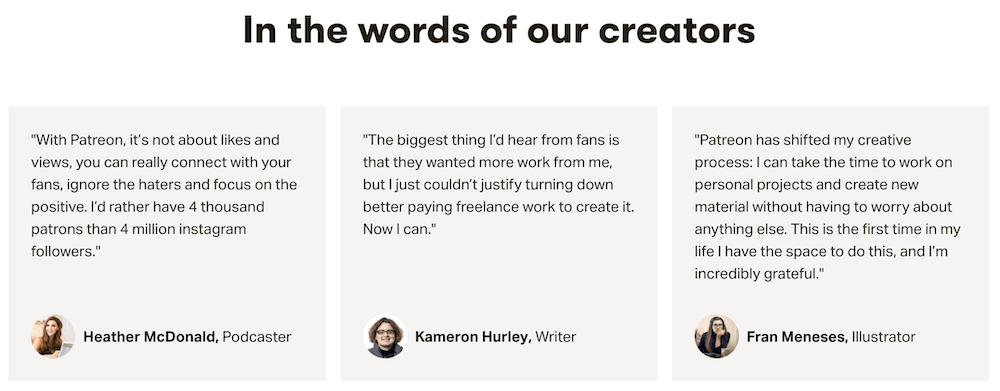
Since we’re leaders in the podcasting space, a question we get asked frequently is how to use Patreon as a podcaster.
Patreon is a crowdfunding membership platform created by Jack Conte and Sam Yam in 2013. The purpose of the platform: to help creators build a relationship with their followers and generate recurring revenue in exchange for their work.
Patreon works the same for any creator:
- A creator offers up special content or a perk for their followers,
- Their followers become a “patron” by investing on a recurring basis, and
- The creator uses the Patreon platform to fulfill the perk or reward.
Sounds cool!
But is using Patreon as a podcaster a good idea?
Quick note before we dive in: we do not use Patreon, and we don’t have any plans to do so in the future. We’re not affiliates, either. This is a flat-out exploration of the platform and whether or not it could prove beneficial to podcasters.
Let’s first dig into how the platform works.
Using Patreon as a creator
With over 100,000 plus creators on the platform, I have to assume that it’s working for at least some of them.
On the Patreon platform, a creator doesn’t have to be a podcaster – a creator could be any number of other things:
- A YouTuber
- A musician
- A visual artist
- A writer
…and the list goes on.
I can certainly see the benefits of joining an established platform like Patreon that will give you the business tools necessary to start generating revenue in exchange for your work. That is, without having to invest in the multiple tools and platforms required if you weren’t using something like Patreon.
But, as is the case with platforms like Patreon, they’re going to take a cut – 10% to be exact.
Using Patreon as a podcaster
Given the supposed simplicity for creator’s on the Patreon platform, giving up 10% seems like a small fee.
But contrary to what the Patreon site claims – about how easy it is to get set up and started – several podcasters seem to disagree:
…I don’t see a report for new patrons, or a way to mark patrons as having received their reward. Right now, I’m just comparing reports manually, which is pretty clunky.
And Teresa Blaes said she struggles with the platform because it’s not fully accessible:
My feelings are kind of mixed, I don’t know if I would recommend it others. The platform is workable, but it’s not great.
Another podcaster I asked about the platform said he’s simply asking for donations via his PayPal page instead, noting that he feels Patreon is “a bit clunky and not that intuitive for new users”:
It’s been about 6-7 months now since I signed up for Patreon, and I’m not really happy with the platform. I’m right now asking my listeners to just use my PayPal page for donations.
But as is the case with almost any platform, everyone’s experience is different. Another podcaster I spoke to noted:
I like it because I can open and close the offerings with a paywall built in. The Patrons I have are obviously dedicated, and I find great joy giving them an inside scope.
In an analysis of top earning podcasts on Patreon, we see there are at least some podcasters doing incredibly well on the platform. For example, at the time I’m writing this post Chapo Trap House has nearly 30,000 patrons, amounting to over $130k in revenue every single month.
What do they offer their patrons? A bonus episode.
And so the story goes, just because something doesn’t work for one person doesn’t mean it won’t work for another.
But Chapo Trap House is clearly a high-level example of a podcast generating revenue on Patreon. The more likely scenario is the podcaster making one or two hundred dollars per month.
Top podcaster Dave Jackson wrote an article about How to Make Money Using Patreon where he talks about the specific ways he’s generating revenue from the platform:
My highest level of Patronage is a discounted version of one-on-one coaching. There is only one spot, and it has been sold out for months.
Dave closes out by sharing he never jumped on Patreon with the thought of replacing his full-time income… But he is able to make his car payment with the monthly recurring revenue.
Let’s look at some of the top ways you might use Patreon as a podcaster. That way, if you are interested in checking it out, you’ll have a few ideas to help you get started!
Getting started on Patreon
Offer bonus podcast episodes or other content
The most common reward podcasters offer up on Patreon is bonus content. This might be additional episodes not published on the public feed, or more in-depth analysis of the topic at hand, like Chapo Trap House.
The idea is that super fans and listeners who are super engaged will pay money in order to access additional content not available to the public.
Offer up your time
Just as you would charge for group coaching, or to answer your client’s questions 1-on-1, you could structure some type of Q&A or bonus time with you.
Listeners who are eager to gain more knowledge from you and to have the opportunity to ask you direct questions would surely be happy to pay a small fee to do so.
In fact, Patreon published a post on their site that shares 19 Patreon Rewards for Podcasters to Offer Their Fans, 5 of which are directly tied to access to the podcast host.
Simply ask for support
Maybe there isn’t any additional content or support being offered by the host? This isn’t the route I would take personally, however, it seems common that podcasters on Patreon simply ask for support.
The idea here is, “If you’ve listened and received some value, then consider supporting us with a donation!”
This is the approach Aditya Jaykumar Iyer (AJ) took.
AJ is the host and founder of the top-ranked podcast, My Seven Chakras, which has received over 2.5 million downloads worldwide with listeners in over 150 countries.
AJ has tested out Patreon using the “simply ask for support” method, and unfortunately Patreon didn’t work out too well for him. Actually AJ is who I quoted above, saying that “Patreon is a bit clunky and not that intuitive for new users.”
He’s currently using his PayPal page to ask for donations, and he said it’s working out great: “I’ve gotten more donations from PayPal in a few days than with Patreon after a few months.”
So if you do try Patreon out, like AJ, and it doesn’t end up being the right platform for you, don’t give up.
Is Patreon really worth it?
So does Patreon really provide enough to make it worth your while as a podcast creator?
According to some of the case studies above, in addition to these user testimonials on their website, Patreon has meant a lot to the growth of these creators’ businesses:

And I’m not going to lie: the Patreon platform does provide a lot of great features to help make “life as a creator” easier.
Some of those features include:
- A WordPress Plugin that lets you lock content on your site, only making it available to those who support you on Patreon.
- A Zapier integration between Patreon and MailChimp that will help you set up patron-only mailing lists.
- An Automated Early Access feature that allows you to push content to your patrons before anyone else gets to see or consume it.
- A built-in tool for running polls, which is great for getting feedback from your listeners.
- An audio RSS feature that will allow you to generate private links you can privately share with your patrons.
And believe it or not, this list actually goes on. After reading about the features Patreon offers, I’m impressed.
If you’re interested in learning more about how to use Patreon as a podcaster, visit Patreon.com.
I also picked out a gem from their blog to share with you as a closer: a thorough guide for anyone interested in getting started on Patreon. Enjoy!